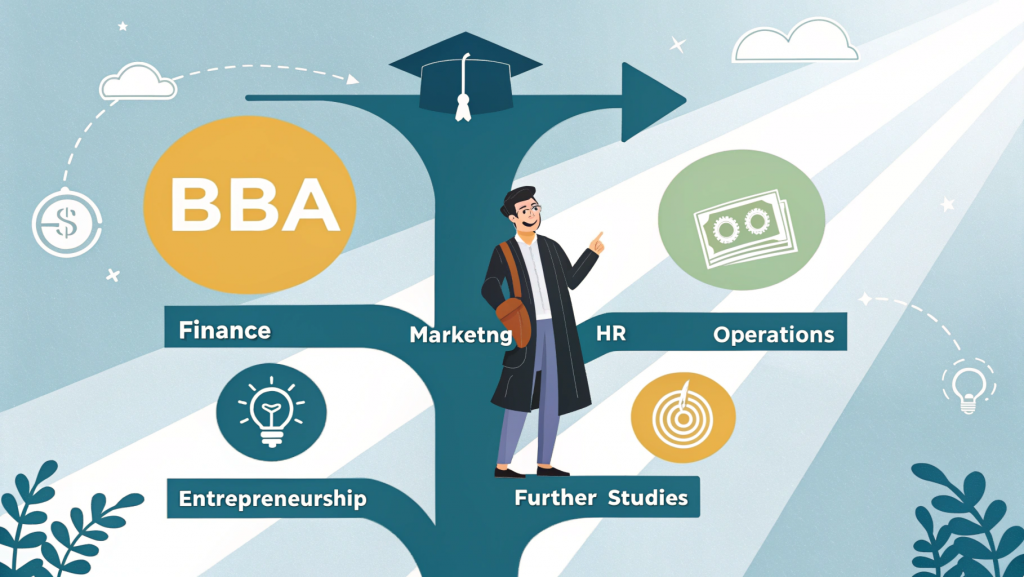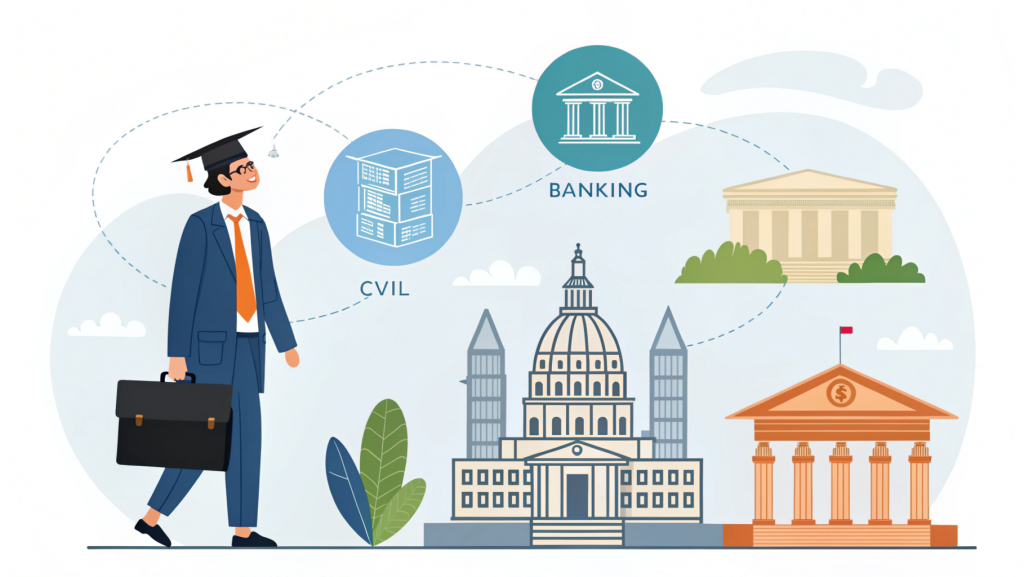Wondering what’s the best career move after your BBA? You’re not alone—most graduates ask this question. The truth is, a BBA degree opens doors to diverse Job Opportunities After BBA, from corporate jobs and government roles to entrepreneurial ventures and higher studies like MBA or PGDM.
In this blog, we’ll break down the complete career scope after BBA—top job options, hiring sectors, salary insights, higher education choices, and even real success stories—to help you plan your next step with confidence.
Why Career Planning After BBA Is Crucial

A BBA degree gives you plenty of career opportunities—but that’s exactly why planning your next step is so important. With so many paths available, it’s easy to feel overwhelmed or end up choosing something that doesn’t really fit your strengths. Career planning helps you cut through the confusion and make smarter decisions for your future.
Here’s how proper career planning can shape your journey after BBA:
| Key Factor | Why It Matters |
|---|---|
| Multiple Career Avenues | Finance, marketing, HR, operations, or entrepreneurship—planning helps you pick the field that matches your strengths. |
| Further Study Choices | Helps you decide whether to pursue MBA/PGDM or a specialized master’s, and choose the right program. |
| Earning Clarity | Gives clarity on salary expectations and career paths that align with your financial goals. |
| Building Core Skills | Encourages you to take internships, certifications, or training that strengthen your profile. |
| Future Roadmap | Helps you set milestones, seek mentorship, and plan for leadership roles in the future. |
| Career Advantage | Shows employers you’re focused and serious about your career. |
| Work Satisfaction | Ensures your career aligns with personal interests and values, leading to a fulfilling work life. |
In short, career planning after BBA isn’t about limiting yourself—it’s about making the right moves with confidence.
Private Sector Jobs for BBA Graduates

One of the biggest advantages of doing a BBA is that it prepares you for the corporate world right after graduation. The private sector is full of opportunities for fresh BBA grads, and the best part is—you don’t always need years of experience to get started.
With a strong foundation in management, communication, and problem-solving, BBA graduates can explore roles across different industries. Whether it’s banking, IT, FMCG, startups, or consultancy firms, companies are always on the lookout for young professionals who can handle business operations.
Here are some of the most popular private sector job roles for BBA graduates:
| Job Role | What You Do |
|---|---|
| Business Development Executive | Help companies grow by finding new clients and building strong relationships. |
| Marketing Executive | Work on campaigns, branding, and promotions to boost sales and brand image. |
| Human Resource Executive | Handle recruitment, training, and employee engagement within organizations. |
| Financial Analyst | Assist in budgeting, investments, and financial planning. |
| Operations Executive | Ensure smooth day-to-day functioning of a company’s processes. |
| Sales Executive | Drive sales targets by understanding customer needs and offering the right products/services. |
The private sector also gives you the chance to switch industries, explore different roles, and climb the career ladder faster if you prove your skills. Plus, startups are a great option for BBA grads who want hands-on experience in multiple areas.
In short, the private sector is like a playground for BBA graduates—dynamic, challenging, but full of growth opportunities if you’re ready to learn and hustle.
Government Job Opportunities After BBA

If you’re someone who prefers stability, security, and respect along with a good salary, then government jobs after BBA can be a great option. The best part? A BBA degree makes you eligible for many popular government exams and roles.
With your background in business and management, you can apply for positions in banking, civil services, railways, defense, and more. These jobs not only offer financial stability but also come with perks like job security, pensions, and work-life balance—which is why they’re always in high demand.
Some of the most popular government opportunities after BBA include:
| Exam/Job Type | Sector | What It Offers |
|---|---|---|
| Banking Jobs (IBPS, SBI PO, Clerk, RBI, etc.) | Banking & Finance | Roles in finance, accounts, and customer handling with good career growth. |
| Civil Services (UPSC, State PSCs) | Administration | Prestigious roles like IAS, IPS, IFS for those who want to serve the nation. |
| SSC & Railways Exams | Government Administration | Officer and administrative-level posts in railways and other central departments. |
| Defense Services (CDS, AFCAT) | Army, Navy, Air Force | Opportunity to join Indian Defense forces with high respect and job security. |
| Public Sector Units (PSUs) | Government-owned Companies | Jobs in top PSUs like ONGC, BHEL, IOCL with stability and long-term perks. |
The key here is preparation. Unlike private jobs where you can get placed directly, most government roles require clearing competitive exams. If you start preparing early—ideally in your final year of BBA—you’ll have a better chance of cracking them.
So, if you’re someone who values stability and long-term benefits, government jobs after BBA can definitely be a smart move.
Entrepreneurial Opportunities for BBA Students

Imagine this—you’ve just completed your BBA, and instead of applying for jobs, you decide to create one. That’s the beauty of entrepreneurship. A BBA doesn’t just prepare you to work in a company; it equips you with the basics to run one.
Many BBA graduates today are stepping into entrepreneurship early in their careers. Some launch their own startups, others turn hobbies into profitable ventures, and quite a few take their family businesses to the next level.
Here are some exciting directions BBA graduates often explore:
Startups & Online Ventures
From e-commerce stores to app-based services, the digital economy is a playground for young entrepreneurs. Think small investments, big reach.
Retail & Lifestyle Businesses
Opening a café, boutique, or event-planning company allows you to combine creativity with business know-how.
Consulting & Freelancing
Good with marketing, HR, or finance? You can work independently as a consultant and help small companies grow.
Family Business Growth
Many students return to their family businesses and introduce new-age ideas like digital marketing, automation, and expansion strategies.
Yes, entrepreneurship comes with risks, but here’s the flip side—it also gives unmatched freedom, creative satisfaction, and the possibility of building something impactful from scratch.
Best PG Courses After BBA (MBA, PGDM, etc.)

So, you’ve finished your BBA and are wondering—“Should I study further or start working?” For many graduates, pursuing a post-graduate course is the smartest way to boost their career options and earning potential. The good thing is, after BBA, you have plenty of exciting choices.
Here are some of the best PG courses you can go for:
- MBA (Master of Business Administration)
The most popular choice after BBA. An MBA gives you advanced knowledge of management, leadership, and business strategy. You can also choose specializations like Marketing, Finance, HR, Operations, or even newer fields like Business Analytics. - PGDM (Post Graduate Diploma in Management)
Similar to an MBA but offered by autonomous institutes. The syllabus is often more industry-oriented and updated to match current trends. Many students prefer PGDM if they’re aiming for corporate placements. - MMS (Master of Management Studies)
A university-level program that focuses on building managerial and leadership skills. It’s quite similar to an MBA but slightly more academic in nature. - M.Com (Master of Commerce)
Ideal if you’re inclined towards finance, accounting, and commerce-related fields. It’s a great choice if you plan to go for research, teaching, or competitive exams later. - International Courses (like MS in Management/Finance)
If studying abroad excites you, you can explore programs like MS in Management, MS in Finance, or even Global MBAs offered by international universities.
At the end of the day, the “best” course depends on your career goals. If you want leadership roles in corporates, go for an MBA/PGDM. If you’re leaning towards academics or finance, M.Com works well. And if you dream of global exposure, international programs could be the right pick.
Top Hiring Sectors (Banking, Marketing, HR, etc.)
One of the best things about a BBA is the flexibility it gives you—you’re not limited to just one industry. In fact, BBA graduates are hired across multiple sectors because of their management, communication, and problem-solving skills.
Here are some of the top sectors that actively hire BBA graduates:
- Banking & Finance
If you’re good with numbers and like working with money, this sector is a great fit. Roles include banking officers, financial analysts, and investment advisors. - Marketing & Sales
Companies are always looking for fresh minds to promote products, manage brands, and drive sales. From digital marketing to advertising, the opportunities here are endless. - Human Resources (HR)
HR professionals are the backbone of any organization. With a BBA, you can work in recruitment, employee training, and people management. - Operations & Supply Chain
This sector is all about ensuring smooth business processes. BBA graduates often work as operations executives, logistics managers, or supply chain coordinators. - IT & Consulting
Many consulting firms and IT companies hire BBA graduates for project management, business analysis, and client handling roles. - Startups & Entrepreneurship
Startups love hiring BBA grads because they bring energy, fresh ideas, and flexibility. You get to wear multiple hats and gain quick hands-on experience.
Each of these sectors has its own growth opportunities, and the best part is—you can explore them early in your career to figure out what excites you the most.
Average Salary Packages by Industry
One of the most common questions after completing a BBA is—“How much salary will I get?” The truth is, it depends a lot on the industry you choose, your skills, and the company you join. But don’t worry—I’ve got a rough idea of average packages that BBA graduates usually start with in India.
Here’s a simple breakdown:
| Industry | Average Starting Salary (per year) | What to Expect |
|---|---|---|
| Banking & Finance | ₹3 – 5 LPA | Roles like banking officer, financial analyst, or investment advisor. |
| Marketing & Sales | ₹3 – 6 LPA | Performance-based sector—higher growth if you’re good at communication and persuasion. |
| Human Resources (HR) | ₹3 – 4.5 LPA | Jobs in recruitment, employee training, and HR operations. |
| Operations & Supply Chain | ₹3 – 5 LPA | Managing day-to-day business processes, logistics, and supply chain tasks. |
| IT & Consulting | ₹4 – 7 LPA | Roles in project management, business analysis, and client servicing. |
| Startups | ₹2.5 – 5 LPA | Salaries may be lower initially, but you gain diverse experience and quick growth. |
Note: These are average entry-level ranges. With experience, networking, and upskilling, BBA graduates can easily double or even triple these numbers within a few years.
Explore our online programs to become future-ready
Transform your career with industry-aligned courses designed by experts.
View All CoursesResume & Interview Tips for BBA Freshers
Landing your first job after BBA can feel a little overwhelming, but with the right resume and interview prep, you can definitely stand out. The trick is to showcase your skills, confidence, and eagerness to learn—even if you don’t have years of experience yet.
Here are some quick resume tips:
- Keep it short and clean – Stick to one page. Employers don’t want long essays.
- Highlight internships & projects – Even small internships or college projects count as real experience.
- Show off your skills – Mention soft skills (communication, teamwork) and hard skills (Excel, digital marketing, finance basics).
- Add achievements – College competitions, leadership roles, or certifications can make you stand out.
And when it comes to interviews, remember these:
- Know your basics – Brush up on BBA subjects like marketing, HR, and finance since interviewers may test fundamentals.
- Do company research – Learn about the company before the interview so you can answer confidently.
- Practice common questions – “Tell me about yourself” and “Why should we hire you?” always come up.
- Body language matters – Smile, maintain eye contact, and sit confidently.
- Ask smart questions – At the end, asking about growth opportunities shows you’re genuinely interested.
Pro Tip: Don’t stress about not having years of experience—companies hiring freshers are more interested in your attitude, confidence, and willingness to learn.
Conclusion
Finishing a BBA is just the starting point of your professional journey—the real growth begins with the choices you make after it. Whether you’re aiming for private sector jobs, government exams, entrepreneurship, or higher studies like an MBA, the key is to plan smartly and pick the path that fits your strengths and goals.
Remember, there’s no “one perfect option” for everyone. Some students thrive in corporate roles, others shine as entrepreneurs, and many find success through further education. What matters most is clarity about where you want to go and the willingness to keep learning along the way.
So, take your time, explore the options we discussed, and make an informed decision. Your BBA has already given you the foundation—now it’s up to you to build the career you’ve always dreamed of.


Leave a Reply